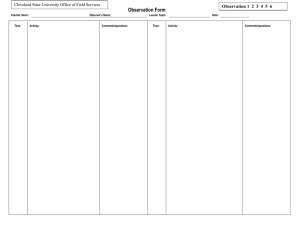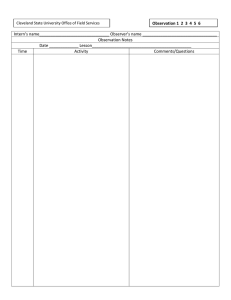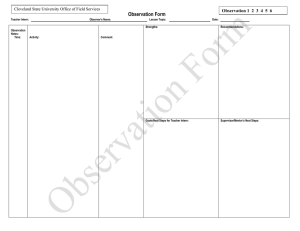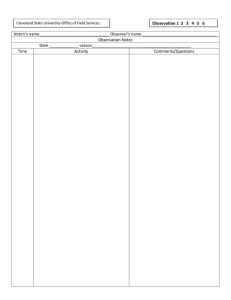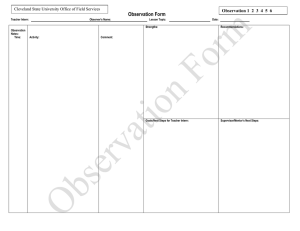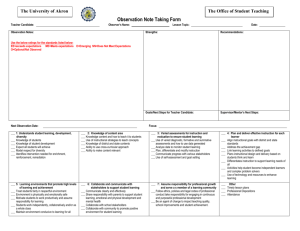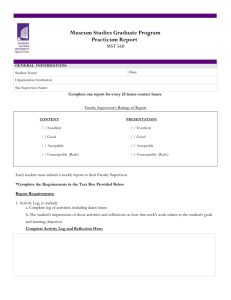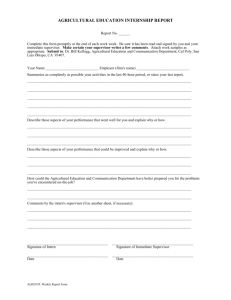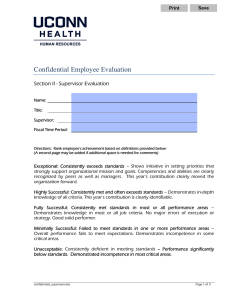Observation Form Cleveland State University Office of Field Services
advertisement
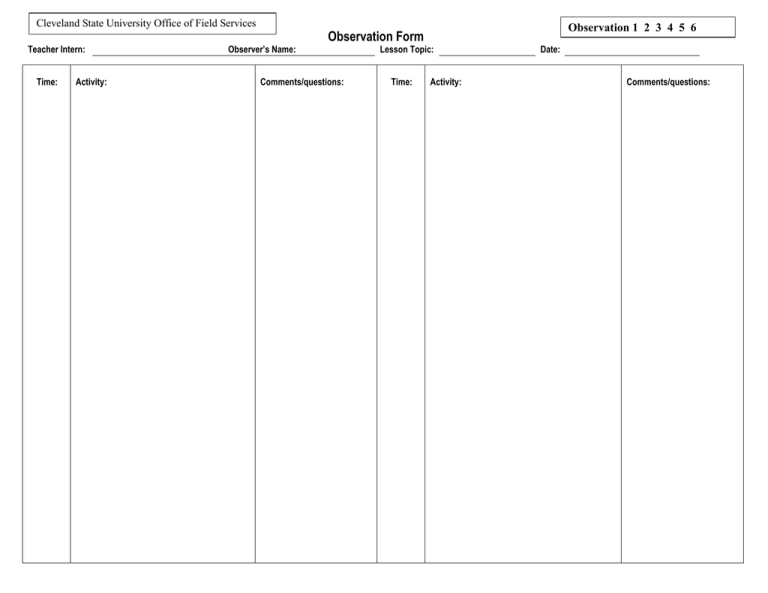
Cleveland State University Office of Field Services Teacher Intern: Time: Activity: Observation 1 2 3 4 5 6 Observation Form Observer’s Name: Comments/questions: Lesson Topic: Time: Activity: Date: Comments/questions: Strengths: Recommendations: Goals/Next Steps for Teacher Intern: Supervisor/Mentor’s Next Steps: Next Observation Date: Focus for next visit: Dispositions: Using the following criteria, check the appropriate box to evaluate the candidate’s professional dispositions. 1 Regular and Punctual Attendance 2 Dependable and Responsible (e.g., initiates timely communication with cooperating teacher and supervisor regarding absences, scheduling, documentation, etc.) 3 Demonstrates positive communication style with students, colleagues, and supervisor 4 Appropriate use of technology for non-classroom activities (e.g., not using Facebook, texting, personal emails, etc.) 5 Appropriate Role Model (e.g., passion for teaching, positive attitude, no inappropriate content on personal websites such as Facebook or Twitter, not “friending” students, etc.) 6 Appropriate Professional Appearance (e.g., proper attire, personal hygiene, etc.) 7 High Ethical Standards (e.g., proper citation of resources, not representing others’ work as your own, adhering to the Student Academic Code of Conduct, etc.) 8 Appropriate Grammar and Vocabulary (including use of slang, inappropriate humor, etc.) 9 Responsive to Constructive Feedback 10 Respects Privacy of Students and Confidentiality of Information Unacceptable Comments: Please provide additional documentation for any disposition that is scored as “Unacceptable” and discuss immediately following the observation. Rating Standards for the teaching profession criteria: Please rate each of the areas as U- Unacceptable (1) E-Emerging (2) M- Meets Expectations (3-4) and check specific areas (+) that were used to determine the rating. 1: Understands student learning, development, diversity Knowledge of students Knowledge of student development Expect all students will achieve Models respect for diversity Identifies intervention needed for enrichment, reinforcement, remediation 2: Knowledge of content area Knowledge content and how to teach it to students Use of instructional strategies to teach concepts Knowledge of district and state contents Ability to use cross-curricular approach Ability to make content relevant Comments : Acceptable 3: Varied assessments for instruction and evaluation to ensure student learning Use of varied diagnostic, formative and summative assessments and how to use data generated Analyze data to monitor student learning Plan, differentiate and modify instruction Communicate progress with various stakeholders Use of self-assessment and goal setting 4: Plan and deliver effective instruction for each learner Align instructional goals with district and state standards Address the achievement gap Link learning activities to defined goals Plans instructional design and delivery based on how students think and learn Differentiates instruction to support learning needs of all students Activities help student become independent learners and complex problem solvers Use of technology and resources to enhance learning 5: Learning environments that promote high levels of learning and achievement Treat students fairly in respectful environment Environment is physically and emotionally safe Motivate students to work productively and assume responsibility for learning Students work independently, collaboratively and/or as a whole class Maintain environment conducive to learning for all 6: Collaborate and communicate with stakeholders to support student learning Communicate clearly and effectively Share responsibility with parents to support student learning, emotional and physical development and mental health Collaborate with school stakeholders Collaborate with community to promote positive environment for student learning 7: Assume responsibility for professional growth and serve a s member of a learning community Follow ethics, policies and legal codes of professional conduct, take responsibility for engaging in continuous and purposeful professional development Be an agent of change to impact teaching quality, school improvements and student achievement. 8: Classroom Management Skills States/posts specific & appropriate expectations for classroom behavior Applies rules consistently and fairly Maintains students’ attention throughout lesson Promotes positive behavior/s Comments:
